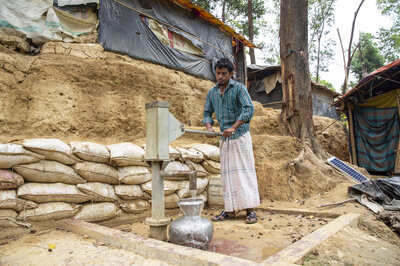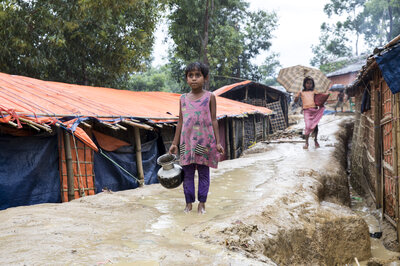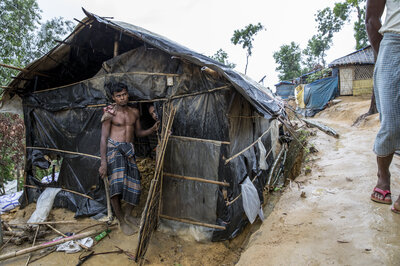“That morning I saw armed men come into the village and set the houses on fire. They shot at my neighbors as they fled. I immediately hid in the bushes. I saw everything through the branches: the burning houses and everything else...”
Rabeya Begum lives with her family in the Kutupalong-Balukhali refugee camp in southeastern Bangladesh. She sits on a rug inside her bamboo and plastic tarpaulin shelter, speaking calmly and quietly. Neither her voice nor her body language reveal her inner turmoil as she recounts her story, which is also the story of her people, the Rohingya. The 21-year-old woman boldly faces the challenges that each new day brings, while lovingly caring for her six-month-old son who was born in the camp, where she had no choice but to settle.
Everything lost in minutes
Rabeya was six months pregnant when she witnessed the terrible acts of violence that forced her to flee her home, her village and her country with her husband to save her own life and that of her unborn child. Within just a few minutes, her life was abruptly changed. The family fled from Myanmar to neighboring Bangladesh together with Rabeya’s father-in-law. Rabeya’s husband Mohamad continues the story about that tragic day in September 2017. He is wearing a traditional longyi skirt and an undershirt.
Mohamad sits next to his wife and takes the baby into his arms. It is stiflingly hot and humid in the camp. A small fan is offered for visitors to cool off. Hospitality is very important in this country, even under the most adverse circumstances. With a sad expression on his face Mohamad tells his story.
During the conversation with the couple, one word repeatedly comes to mind: resilience, that fundamentally human ability to pick yourself up after the worst experience and start over again. Despite the blows that fate has dealt them during their young lives, the couple continue to meet adversities with a level of courage and humility that deserves the utmost respect.
Mohamad, young Rohingya in the refugee camp Kutupalong-Balukhali
Protecting health with latrines
After a short stay in a detention center, the family was sent to Camp 8E, Block 69, where Mohamad’s uncle had already found refuge. Helvetas is setting up latrines and biogas-fueled communal kitchens here.
Like Rabeya’s family, more than 600,000 refugees arrived in the camp within a few weeks, settling wherever they could. The Kutupalong-Balukhali camp has replaced Dadaab in Kenya as the largest and most densely populated refugee camp in the world. The couple’s fellow refugees are spread out over an area of more than 15 square kilometers.
They built their huts themselves with materials provided by the Bangladeshi army and international aid organizations. Trees were cut down to create more space and allow for cooking, turning the once lush green area into a sea of shelters. In such a densely populated camp, the risk of epidemics is extremely high, making the construction of latrines very important. Sanitation helps reduce this risk by preventing fecal contamination of the drinking water supply. Helvetas is helping construct 320 latrines that will benefit around 20,000 refugees. Half of these were completed by the end of June.
However, given the huge demand, this number is not even close to adequate, and the Helvetas teams are ready to build more facilities as soon as funds allow. At the same time, Helvetas is carrying out campaigns to raise hygiene awareness. Many refugees have little to no knowledge of hygienic practices, so training is being offered to the men and women who use the latrines. “I am glad that my neighbors are also participating in the training. This will help us prevent disease,” says Rabeya, who attended a training session the day before and is determined not to get sick.
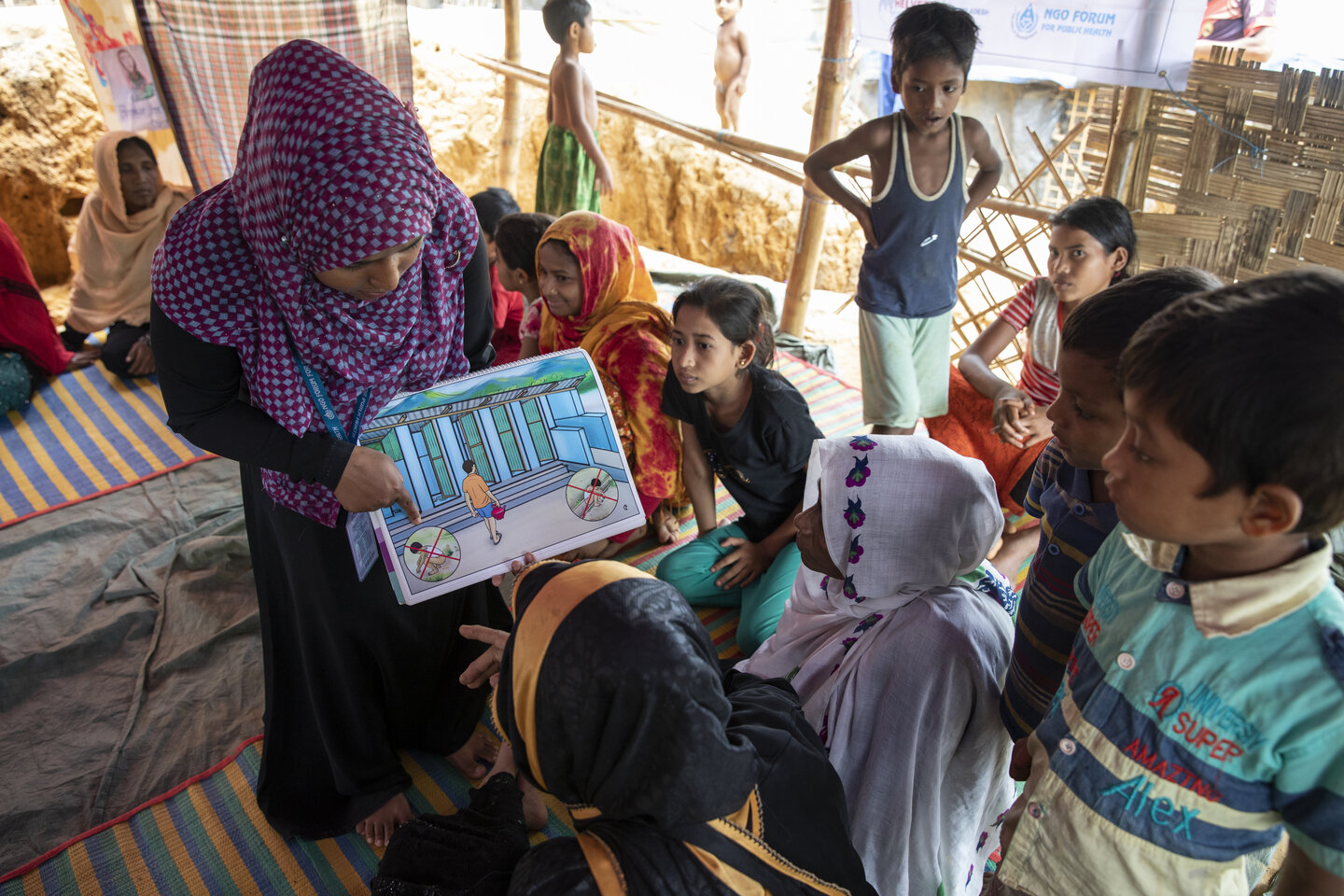
The construction of the latrines also creates temporary work and income opportunities for the refugees. “With the money I earn as a day laborer, I can improve our everyday lives a little bit,” says Mohamad. “My pockets are empty most of the time, but if I’m able to work, I can earn 350 taka per day.” That’s equal to around four US dollars.
After nine months of eating rice and lentil rations distributed by UN agencies, the lack of fresh vegetables and fish is noticeable. This means that vegetables and fish are usually the first things the families buy once they have a little money.
Biogas kitchens prevent deforestation
Because of the large number of refugees, small shops selling non-perishable goods such as crackers, cookies and candy have naturally sprung up in the camp – a sign that life goes on no matter the circumstances. Similarly, a firewood business has emerged. Firewood is needed for cooking, but obtaining it is a major challenge for the camp’s residents.
Those who, like Mohamad, earn some money every now and then can buy ten kilos of wood for 100 taka. “This will last us a couple of days. Otherwise, we have to travel very far to fetch wood,” says Mohamad. The vast majority of refugees have no choice. They must walk six to eight hours to find wood in the hills that lie around 15 kilometers from the camp. Sometimes all they can find is roots or even just bark. “If I have no money, I have to decide if I should go get more wood or stay here and hope for work,” says Mohamad.
If he misses one of the rare job opportunities, he will miss the chance to make life easier for himself and his family. On the other hand, it’s impossible to make do without fire. The Helvetas project offers a solution to this dilemma, which is further exacerbating the already difficult situation of the Rohingya. In biogas-fueled communal kitchens, the refugees can cook without firewood.
The gas for the cooking stoves comes from airtight containers, in which feces from the latrines are converted to methane through fermentation. The gas is channeled into the kitchens through a system of thin tubes. This innovative, environmentally friendly solution not only improves the living conditions of the refugees, it also stops the clear-cutting of forests.
Fear of the big rain
A heavy wind gust interrupts the conversation with Rabeya and Mohamad. At the time of our visit in late May, the weather is very humid. Dark clouds pile up in the sky, and it looks like rain. Last night, the first violent rainstorm of the season made it clear just how precarious the circumstances are for the displaced population here. The wind gusts have been strong enough to rip the roofs and walls off some of the shelters.
The worry is written all over his face, as he remembers all too well when they arrived at the camp last fall, and there were places where the mud was up to their knees. Because the subsurface here is barely permeable, the heavy clay soil can become quite slippery in the rain. This means there is a high risk of mudslides, especially since there are hardly any trees to hold back the soil. The UN estimates that 175,000 refugees live in high-risk areas.
Helvetas is committed to finding a solution for this dangerous situation. Teams work to raise awareness among the population in the most vulnerable areas. Thanks to these efforts, the refugees can help secure dangerously steep slopes by planting vetiver, a fast-growing grass that does a good job of stabilizing the soil. The steepest slopes are further reinforced with piles of sandbags. However, the situation continues to raise concerns because of the lack of reliable forecasts. The intensity of the monsoon season varies from year to year, but on average, as much rain falls here in one month as does in an entire year in Switzerland. And the rainy season lasts three months, from June to September.
What will become of their little one?
After discussing all the hardships, our conversation now turns to what the future holds for the family of three.“Where are we supposed to go?" asks the young mother worriedly.The family would like to move close to Rabeya’s brothers in Chittagong, the second largest city in Bangladesh, but they would not make it past the checkpoints. They do not speak Bengali and have no identification.
“I loved my old life. I was happy taking care of our farm. And I miss all the friends and neighbors we had,” says Rabeya. Anticipating the next question, Mohamad says they would love to return home. "But as long as our safety is not guaranteed there, we will not return.” It’s not just the refugees who are concerned about their future. The authorities and the international community share their anxiety. One year has passed since most of the Rohingya arrived in Bangladesh, but there is no solution in sight. Although an agreement between Myanmar and Bangladesh provides for the repatriation of refugees, there are no concrete signs that this agreement is being implemented.
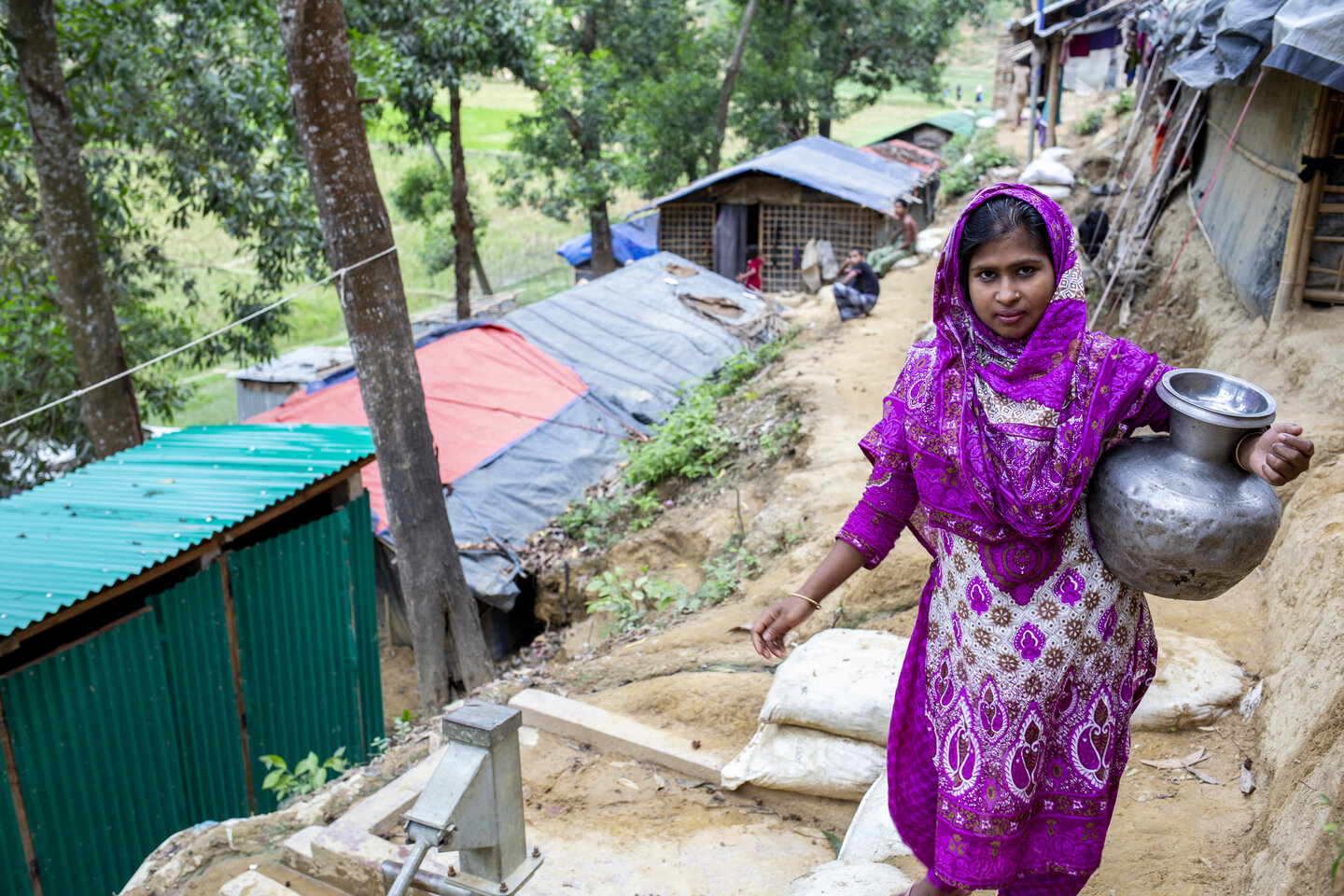
Soon night will arrive in the largest refugee camp in the world. The clouds still look threatening. Everyone hopes the skies will be kind to them tonight. What does the future hold for little Mohamad Rizwan, who was born in this camp six months ago? He has never been to his homeland and he has no papers. “I hope he does not have to grow up in this camp,” says Rabeya, looking tenderly at her child, who has fallen asleep in his father’s arms. She adds quietly: “But the most important thing is that he is safe.”






